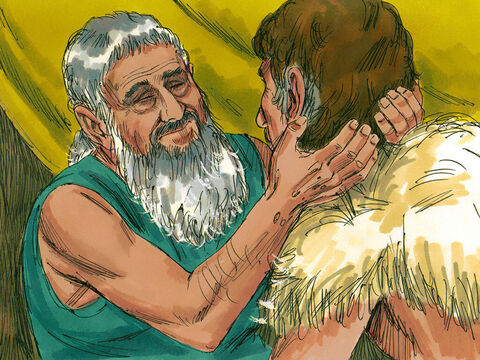[For articles on the “Sabbath of Toldot" in Hebrew, click here]
Rabbi Dr. Yossi Feintuch was born in Afula and holds a Ph.D. in American history from Emory University in Atlanta. He taught American history at Ben-Gurion University.
Author of the book US Policy on Jerusalem.
He is the rabbi of Congregation Shalom Bayit in Bend, Oregon.
* * *
By the time Isaac decides to proffer on Jacob, who through mummery and guile presented himself to his father for the “death-bed blessing’’ that was intended for his elder twin brother Esau, Isaac had already sensed that he, whose voice was “the voice of Jacob”, while his hands were “Esau’s hands”, was no other than Jacob. Though Jacob was pulling a fast one on his father, Isaac was not deceived. He knew that he was blessing Jacob, the lentil ''chef'': “May God grant you from the dew of the heavens and the fat of the earth, and abundance of grain and drink”. When Esau presented himself for the same blessing and the deception was officially outed, Isaac eked out another similar land produce-based blessing, even for Esau the hunter. It was similar to Jacob’s, namely, “from the fatness of the earth” and “from the dew of heaven on high.” Isaac, who evidently loved meat, whether of livestock or game, dispenses his blessings to both of his sons mentioning nothing about thriving flocks of cattle, let alone copious game. He wanted his sons to derive their sustenance mainly from farming the earth, and not from livestock or animals in the wild.
[Picture: Isaac blesses Jacob. freebibleimages]
Two decades later (or in next week's Parasha -- VaYetse), as a salaried shepherd in the employ of Laban, the father of both of his wives, Leah and Rachel, Jacob reminds his father-in-law about his persevered ethical integrity during all these years. And he tells him that even “the rams of your flock I have not eaten” (which would have been his right to do). It is apparent that Isaac’s blessing to his sons that made no mention of meat became a well-nigh reality even in Jacob’s sustenance while shepherding Laban’s flocks for two decades. That should not come as a surprise, given that our first introduction to Jacob’s cooking – that even Esau voraciously desired in-as-much as to trade off his first-born status for it – was a hearty vegetarian lentil stew.
The elevation of such plant-based food over the flesh of animals was embedded even in the Pharaoh’s dream (Parashat MiKetz) which he later related to Joseph for interpretation. The first dream involved seven foul-looking meager-fleshed cows that ate up seven plump cows, yet remained as scrawny as they were before. This dream that prefigured the end of meat supply for Egypt did not perturb the Monarch for he went right on to fall asleep. But another dream woke him up, that of seven wilted and lean ears of grain that swallowed up another seven full and goodly ears. At this time the Pharaoh could not go back to sleep; Indeed, with his spirit agitated he summoned “all the soothsayers of Egypt and all its wise men’’ to interpret for him the dreams, even as he did not return to sleep.
Still, one major point of these two dreams is the possibility that Egypt would be running out of meat, but evidently, it was not a deep concern for the Pharaoh. Hence worry-free and undisturbed the Pharaoh goes back to sleep despite the demise of the fair-looking fat cows. Only, when he realized that his second dream might herald the cessation of grain, the Pharaoh looked for an interpretation for his dreams and a solution for what was coming at his kingdom. To judge by the Pharaoh’s reactions to his dreams it is evident that the Pharaoh embraced God’s view from the very beginning of creation whereby land produce is the very staple food for mortals, even as meat for the Hebrews was gratuitous and a non-essential food.
This concept is evidenced in Isaac's blessings to Jacob and Esau as in this weekly Parasha, Toldot. Might this be the reason why in the classical Levitical text on a gift (mincha) to God (Ch.2) the plant-based tribute serves not only as an alternative to animal offerings but even as superior to the latter? Notably, Isaac does erect an altar for God in Beersheba, but like in the majority of altar-building by his father Abraham, no animals are slain there (Genesis 26:25).
[For articles on the “Sabbath of Toldot" in Hebrew, click here]







